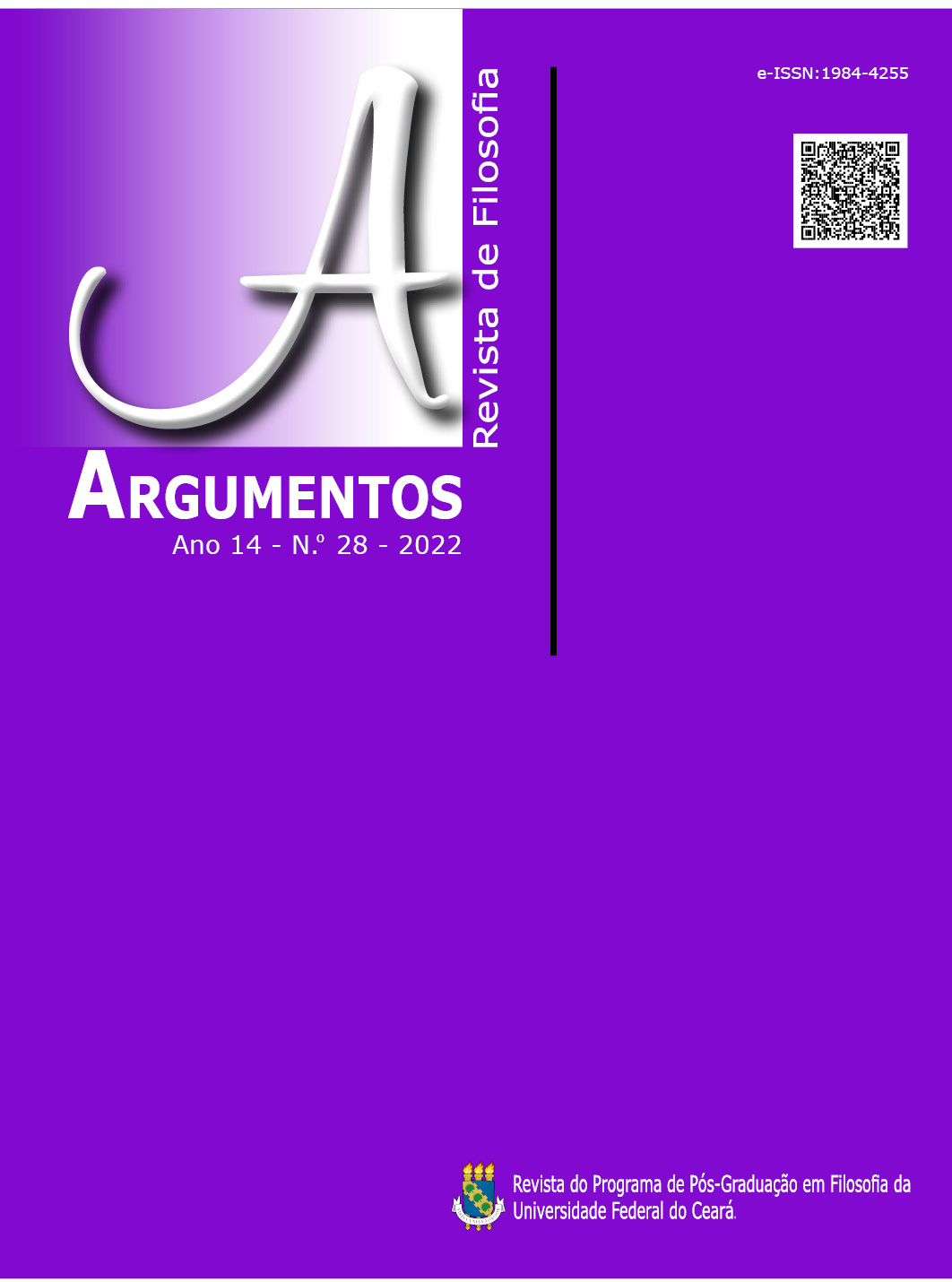Criticism to instrumentalization of man
DOI:
https://doi.org/10.36517/Argumentos.28.7Keywords:
Antropotechnique. Instrumentation. Human-enhancement. Criticism.Abstract
This work intends to present some criticisms to the idea of the instrumentalization of man, which is based on an anthropological technology for the reboot of the qualities of the human species (anthropotechnics), seen as an improvement tool because it has the potential to remake and modify human biology. In this manner, we will highlight the need for a moralization of human nature in face of the potential of this technology.
References
BRETON, D. Adeus ao corpo. In: NOVAES, A. (Org.). O homem-máquina: a ciência manipula o corpo. São Paulo: Companhia das Letras, 2003.
ELITE. MicroSort gender selection overview. Disponível em: https://www.lowcostivf.net/microsort-genderselection.html. Acesso em: 20.ago.2021.
FELDHAUS, C. O futuro da natureza humana de Jürgen Habermas: um comentário. Revista ethic@. v. 4, n. 4, p. 309-319, 2005.
FUKUYAMA, Francis. Nosso futuro pós-humano: consequências da revolução da biotecnologia. Rio de Janeiro: Rocco, 2003.
GARREAU, J. Radical evolution. New York: Broadway Books, 2006.
HABERMAS, J.; FREITAG, B.; ROUANET, S. P. Habermas: sociologia. São Paulo: Ática, 1980.
HABERMAS, J. Consciência moral e agir comunicativo. 2ª ed. Rio de Janeiro: Tempo Brasileiro, 2003.
HABERMAS, J. O futuro da natureza humana: a caminho de uma eugenia liberal? São Paulo: Martins Fontes, 2004.
HABERMAS, J.; SAVIDAN, P. A ética da discussão e a questão da verdade. 2ª ed. São Paulo: M. Fontes, 2007.
HOTTOIS, G. Humanismo, Transhumanismo, Posthumanismo. Revista Colombiana de Bioética, Universidad El Bosque, Bogotá, v. 8, n. 2, p. 167-192, 2013.
JASTROW, R. The Enchanted Loom: Mind in the Universe. New York: Simon and Schuster, 1981.
KASS, L. Life, liberty, and the defense of dignity: the challenge for bioethics. San Francisco: Encounter Books, 2002.
LIMA, Aluísio Ferreira de. Resenha: Habermas, J. O futuro da natureza humana: a caminho de uma eugenia liberal? Revista de Psicologia. v. XI, n. 16, p. 275-281, 2007.
PICO DELLA MIRANDOLA, G. Oration on the dignity of man. Chicago: Gateway Editions, 1956.
SFEZ, Lucien. A saúde perfeita: crítica de uma nova utopia. São Paulo: Loyola, 1996.
SAVULESCU, J.; BOSTROM, N. Human enhancement. Oxford: Oxford University Press, 2009.
SANDEL, Michael J. Justiça: o que é fazer a coisa certa. Rio de Janeiro: Civilização brasileira, 2011.
SANDEL, Michael J. Contra a perfeição: ética na era da engenharia genética. Rio de Janeiro: Civilização Brasileira, 2013.
SIGNIFICADOS. Significado de sui generis. Disponível em: https://www.significados.com.br/sui-generis/. Acesso em: 15.fev.2021.
SLOTERDIJK, Peter. Regras para o parque humano: uma resposta à carta de Heidegger ao humanismo. São Paulo: Estação Liberdade, 2000.
THE GUARDIAN. Lesbian couple have deaf baby by choice. Disponível em: https://www.theguardian.com/world/2002/apr/08/davidteather. Acesso em: 09.dez.2021.
TIME. What should the rules Be? Disponível em: http://content.time.com/time/magazine/article/0,9171,95244,00.html. Acesso em: 02.jun.2021.
WIENER, N. Cibernética e sociedade. São Paulo: Cultrix, 1968.
WOLFE, C. What is posthumanism? London: University of Minnesota Press, 2010.
Downloads
Published
Issue
Section
License
Argumentos magazine is licensed under an International Creative Commons Attribution License.
The Magazine uses CC BY inclusion
1) The authors retain the copyright granted to the magazine or the right to initial publication, with the work regularly licensed under the Creative Commons Attribution, which allows the sharing of the work with acknowledgment of authorship and initial publication in this magazine.
2) The authors are authorized to contract additional applicable contracts, for non-exclusive distribution of the version of the work published in this journal (for example, publication in the institutional repository or as a chapter of the book), recognition of authorship and initial publication in this journal.
3) Authors are authorized and encourage to publish and distribute their work online (for example, in institutional repositories or on their personal pages) at any time before or during the editorial process, as they can generate productive changes, as well as increase the impact and reference of published work.




.jpg)










._._3.png)
1.jpg)
._._._.png)
